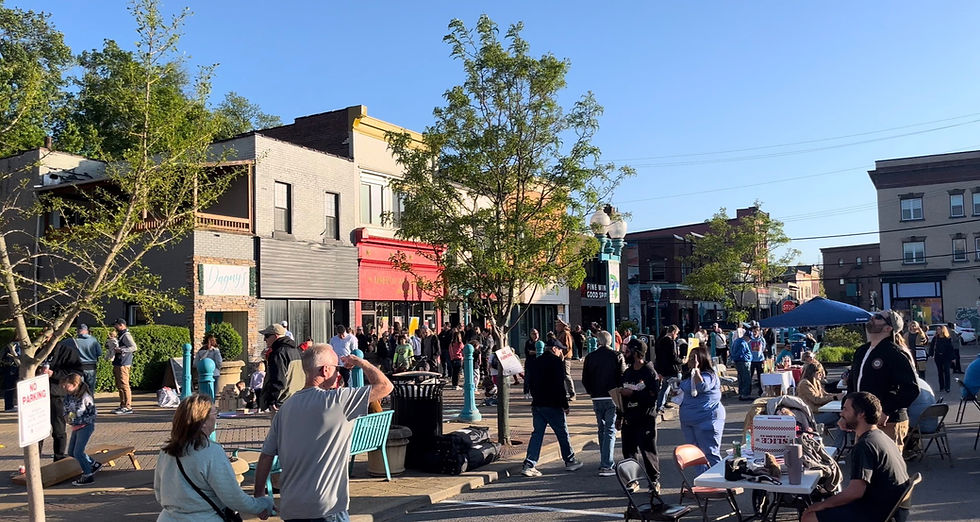The Pros and Cons of Using Solar Power in Pittsburgh
- Shari Berg
- Apr 1, 2021
- 4 min read
Updated: May 28, 2021

Four years ago, Shaler resident John Stolz invested in solar panels for his home. Although he could have bought them outright, he decided to go the route most homeowners choose. Stolz opted for a solar lease or power purchase agreement (PPA) through SolarCity/Tesla Energy.
As the director of the Center for Environmental Research and Education at Duquesne University, he wanted to explore how difficult it was for an average residential homeowner to harness the power of solar energy. Financing makes solar more affordable for everyone, but there is a downside.
“I have not laid out a dime for my panels,” Stolz said. “The flip side is I’m paying a little over 12 cents per kilowatt-hour (kWh). That’s kind of high, but that’s to offset the cost of the panels. And I only pay for the power that I use.”
There are benefits to using solar, even if you are financing the solar panels. For instance, if a homeowner generates 5 kWh but only uses 4 kWh, the non-used kWh is banked with the homeowner’s electricity supplier. In Stolz’s instance, that is Duquesne Light.
“So basically, I only pay for the amount of power that I produce,” said Stolz. “If I need additional power at different times, like in the winter, and I have to buy power off the grid, the extra power that I produced is banked with Duquesne Light so I can draw from that.”
Initially, the Pennsylvania Utility Commission (PUC) put a cap on how much a residential solar panel owner could produce at 200 percent of their annual consumption or a maximum of 50kW. The cap, however, was overturned by the state’s Independent Regulatory Review Commission in 2016. The 50kW maximum is still enforced.
Do Solar Panels Work in Pittsburgh?
Solar panels rely on the power of the sun to produce energy. Look outside your window on any given day in the Pittsburgh region, and you may be hard-pressed to find that bright glowing object in the sky. On average, Pittsburgh sees 160 sunny days each year. The nationwide average is 205. Precipitation, whether rain or snow, falls in Pittsburgh 140 days out of the year. So it’s easy to see why some homeowners would be concerned that they would not get much bang for their buck with solar panels.
Stolz said it is time to put this misinformation to rest. “Are you going to generate more power on a sunny day? Absolutely,” he said. “But even on a cloudy day, light is still generating power through your panels. It’s just not as much.”
Living in Pittsburgh has an advantage over hotter, sunnier places like Arizona or Nevada, where it is mostly desert land. Peak energy days are higher in our region than in those places because solar panels are designed to work more efficiently in cooler climates.
Stolz said the highest-producing months of the year for Pittsburgh solar panels are from May through September. January and February are the lowest-producing months due to shorter days, lower sun positioning, more cloudy days, and snow and ice that can cling to the panels and cause reduced efficiency. His system is designed to generate 5,600 kWh a year and has averaged about 5,000 kWh over the past three years.
Installation Costs, Rebates and Tax Breaks
Stolz added that there are a lot of great deals in place making solar panels for residential properties more affordable than ever. “The cost for panels has never been as low as it is right now,” he said.
Many solar companies are servicing the Pittsburgh region, so customers can pick the provider offering deals and incentives that align with their budgets.
The average residential solar installation locally is around 5 kW. At an estimated price of just over $3 per watt, total costs would be between $13,000 and $18,000. This price does not account for savings from the Federal Investment Tax Credit (ITC) and other state and local incentives. When tax breaks and other incentives are included, the average installation cost can decline by thousands of dollars.
Federal tax credits for residential energy efficiency were extended retroactively through Dec. 31, 2021. These are the federal tax credits that apply to primary residences. At present, they are 10 percent of the cost up to $500 for existing residential homes only.
Pennsylvania has two programs in support of residential solar:
• Net Metering: As previously mentioned by Stolz, this allows residential customers to bank their solar energy for use later. They can sell their excess solar energy back to the grid at the same price at which they purchased it.
• Solar Renewable Energy Certificates (SRECs): This program allows Pennsylvania homeowners with solar panels to sell the SRECs that their solar panels generate. The current going rate is $24, meaning a 5 kWh system generating 5 megawatts per hour (MWh) could earn an extra $120 per year selling their credits in the SREC market.
Solar Panel Maintenance
Once you have solar panels installed, you will want to maintain them properly to ensure optimal performance. Annual cleaning and inspection are recommended. Most solar panel manufacturers recommend cleaning the panels twice a year to achieve a 3 to 5 percent increase in efficiency.
There are many reasons to consider solar panels for your home, least of all the energy savings you can achieve. Stolz said that when homeowners weigh the pros and cons of installing solar, they will discover the benefits far outweigh the risks.
“It’s quite liberating in the sense that there is no reason why we shouldn’t be doing this; this is low-hanging fruit,” he said. “These panels last 20 to 30 years, with improved efficiency and life expectancy.


























Solar energy is definitely gaining traction in Pittsburgh, especially with rising utility costs and the push for more sustainable living. While the upfront investment can feel overwhelming, the long-term benefits of reducing electricity bills and lowering environmental impact are hard to ignore. Many homeowners also explore solar-compatible tools to maximize efficiency. For instance, products like the https://gosun.co/products/12v-water-heater-submersible can make renewable setups even more practical by supporting daily needs with clean energy. Despite weather challenges in Pittsburgh, advancements in solar technology continue to prove that the pros outweigh the cons for most households.